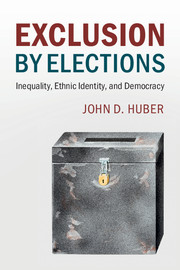Book contents
- Frontmatter
- Contents
- List of Figures
- List of Tables
- Acknowledgments
- 1 Introduction
- 2 Why Worry about Inequality and Ethnic Politics?
- PART I THE THEORETICAL ARGUMENT
- PART II EMPIRICAL EVIDENCE FOR THE ARGUMENT
- 6 Theory and Causal Identification
- 7 Income and Voting Behavior
- 8 Inequality, Ethnic Diversity, and the Ethnification of Party Systems
- 9 Social Structure, Redistribution, and Democratic Transitions
- 10 Conclusion: Inequality and the Politics of Exclusion
- References
- Index
- Miscellaneous Endmatter
7 - Income and Voting Behavior
from PART II - EMPIRICAL EVIDENCE FOR THE ARGUMENT
Published online by Cambridge University Press: 18 May 2017
- Frontmatter
- Contents
- List of Figures
- List of Tables
- Acknowledgments
- 1 Introduction
- 2 Why Worry about Inequality and Ethnic Politics?
- PART I THE THEORETICAL ARGUMENT
- PART II EMPIRICAL EVIDENCE FOR THE ARGUMENT
- 6 Theory and Causal Identification
- 7 Income and Voting Behavior
- 8 Inequality, Ethnic Diversity, and the Ethnification of Party Systems
- 9 Social Structure, Redistribution, and Democratic Transitions
- 10 Conclusion: Inequality and the Politics of Exclusion
- References
- Index
- Miscellaneous Endmatter
Summary
The theoretical argument provides intuitions about how economic inequality and ethnic diversity interact to influence electoral politics. This chapter focuses on one micro-level empirical implication of the argument for electoral behavior, which is whether the relationship between income and vote choice differs with a country's level of inequality and ethnic polarization. When class politics is prevalent, voters should be more likely to sort themselves by income, with poorer individuals supporting more left-wing parties that favor economic redistribution and richer individuals supporting more right-wing parties that oppose such redistribution. Thus, when the conditions for class politics that are related to economic inequality and ethnic diversity are strong, income should play a stronger role in vote choice. Similarly, if the conditions for class politics lead to an emphasis on redistribution in electoral competition and electoral behavior, attitudes toward such redistribution should have the strongest relationship with individual income when the conditions for class politics are strongest. The empirical results provide consistent support for the theoretical argument. When the conditions for class politics are strong, there is a stronger relationship between income and voting behavior.
The chapter is organized as follows. The next section describes the data, and then Section 7.2 presents the analysis of the relationship between an individual's income and his or her voting behavior, as well as an analysis of the relationship between income and attitudes toward inequality. Finally, Section 7.3 explores these same types of relationships, but dividing up the data into countries that have recently democratized and countries that have a longer history with democracy.
THE DATA
Testing the micro-level implications of the argument about income and vote choice requires individual-level data on income and voting behavior across a large number of democratic countries that vary in their levels of inequality and ethnic diversity. In addition, it will be important to place parties on a left-right redistributive scale. To this end, I use the World Values Survey (WVS), which measures income, respondents' preferred party, attitudes toward redistribution, and a number of important control variables.
- Type
- Chapter
- Information
- Exclusion by ElectionsInequality, Ethnic Identity, and Democracy, pp. 114 - 143Publisher: Cambridge University PressPrint publication year: 2017
- 1
- Cited by

